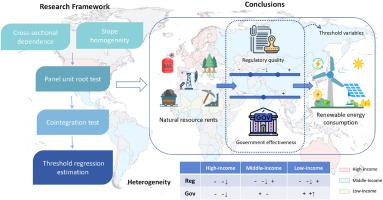自然资源是可再生能源的福还是祸?揭示监管质量和政府效率在缓解诅咒中的作用
IF 10.2
2区 经济学
0 ENVIRONMENTAL STUDIES
引用次数: 0
摘要
本研究探讨了政府有效制定和实施合理政策的能力(监管质量和政府效率)能否改善自然资源租金与可再生能源消费之间的关系。我们采用面板阈值回归估计法分析了 2000 年至 2020 年的 96 个国家,并将这些国家分为三个收入组进行异质性分析。结果表明:(i)自然资源租金与可再生能源消费之间的相关性呈现非线性模式,呈 "U "型。(ii) 当监管质量和政府效率提高时,自然资源租金对可再生能源消费的负面影响会减弱甚至逆转。这表明,政府制定并有效实施合理的政策有利于缓解甚至重塑自然资源对可再生能源的诅咒。(iii) 监管质量和政府效率对高收入国家的影响最大,对低收入国家的影响最小,而对中等收入国家的影响则存在一定的不确定性。本文章由计算机程序翻译,如有差异,请以英文原文为准。

Are natural resources a blessing or a curse for renewable energy? Uncovering the role of regulatory quality and government effectiveness in mitigating the curse
This study examines whether the capacity of the government to formulate and implement sound policies effectively (regulatory quality and government effectiveness) can improve the relationship between natural resource rents and renewable energy consumption. We analyze 96 countries from 2000 to 2020 using a panel threshold regression estimation method and divide these countries into three income groups for heterogeneity analysis. The results show that (i) The correlation between natural resource rents and renewable energy consumption exhibits a non-linear pattern, which shows a "U-shaped." (ii) When regulatory quality and government effectiveness are enhanced, the negative influence of natural resource rents on renewable energy consumption is attenuated or even reversed. This indicates that the formulation and effective implementation of sound policies by the government are conducive to mitigating and even reshaping the curse of natural resources on renewable energy. (iii) Regulatory quality and government effectiveness have the most significant influence in high income countries and the smallest impact in countries with low incomes, while there is some uncertainty about the impact in middle income countries.
求助全文
通过发布文献求助,成功后即可免费获取论文全文。
去求助
来源期刊

Resources Policy
ENVIRONMENTAL STUDIES-
CiteScore
13.40
自引率
23.50%
发文量
602
审稿时长
69 days
期刊介绍:
Resources Policy is an international journal focused on the economics and policy aspects of mineral and fossil fuel extraction, production, and utilization. It targets individuals in academia, government, and industry. The journal seeks original research submissions analyzing public policy, economics, social science, geography, and finance in the fields of mining, non-fuel minerals, energy minerals, fossil fuels, and metals. Mineral economics topics covered include mineral market analysis, price analysis, project evaluation, mining and sustainable development, mineral resource rents, resource curse, mineral wealth and corruption, mineral taxation and regulation, strategic minerals and their supply, and the impact of mineral development on local communities and indigenous populations. The journal specifically excludes papers with agriculture, forestry, or fisheries as their primary focus.
 求助内容:
求助内容: 应助结果提醒方式:
应助结果提醒方式:


